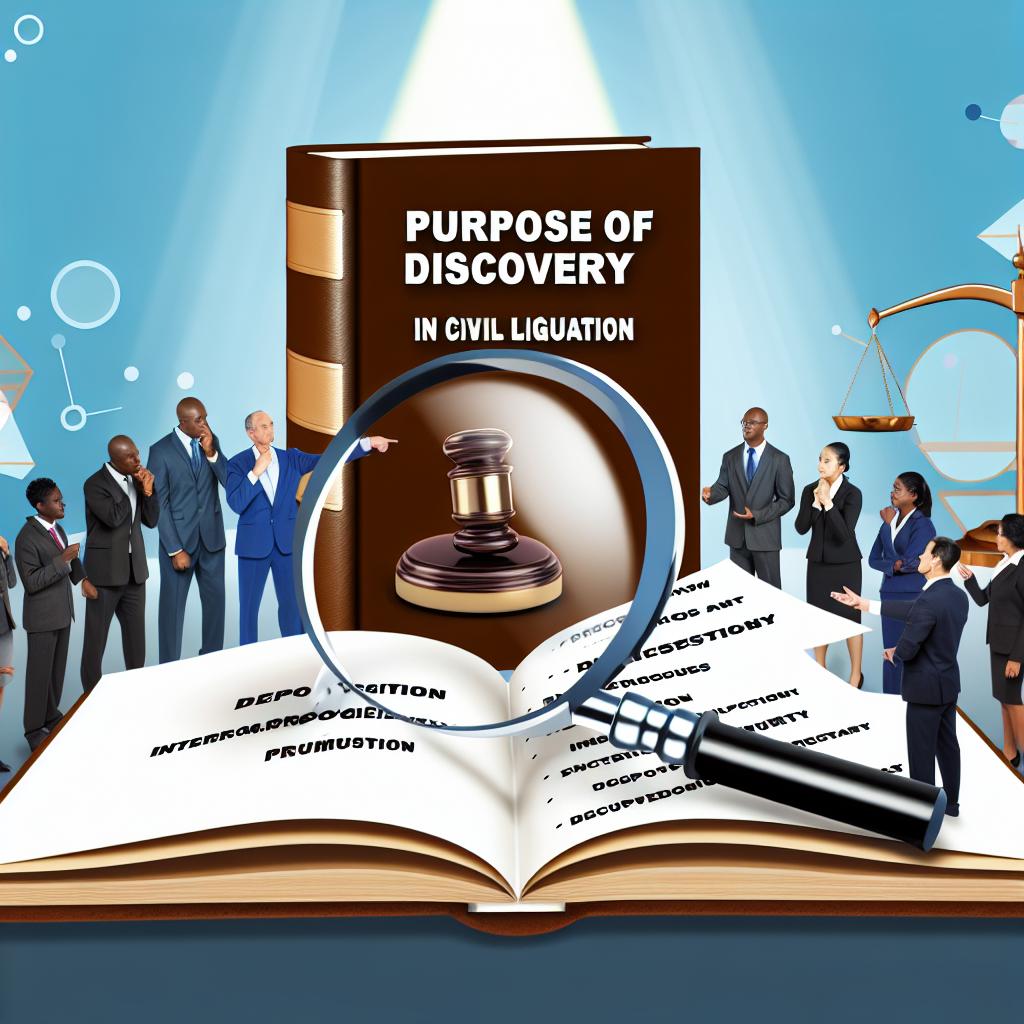Understanding the Purpose of Discovery in Civil Litigation
The discovery process is a pivotal component of civil litigation, serving a fundamental purpose in the justice system. It encompasses a pre-trial procedure where parties to a lawsuit obtain evidence from each other or from third parties. This process ensures that both sides have access to the necessary information to prepare their cases effectively.
The Goals of Discovery
Discovery aims to eliminate surprises at trial by allowing both parties to know the strengths and weaknesses of each other’s case. Such advance disclosure promotes transparency, reducing the risk of unexpected developments during the trial. Through this openness, parties are often more inclined to settle disputes before trial, thus conserving judicial resources. Settlement negotiations are more fruitful when neither party anticipates underestimating or overestimating their chances based on hidden evidence. By fostering a clear understanding of the case details, discovery promotes fair outcomes and supports the integrity of the judicial process, ensuring that justice is served efficiently and equitably.
Clarifying Factual Issues is another crucial objective of the discovery process. During this phase, parties can clarify and narrow down the personal disputes that must be resolved at trial. This often results in simplified proceedings, with pre-trial motions narrowing the focus of the litigation. As cases proceed to trial, the clarity achieved through discovery enables the court to concentrate on the core issues requiring adjudication. With peripheral disputes minimized, both parties and the court can allocate their time and resources effectively, concentrating on substantive matters.
Tools of Discovery
The discovery process is facilitated through various tools, each serving distinct needs and purposes.
One of the most common tools is the deposition, where witnesses are questioned under oath before the trial. This tool provides a unique opportunity for attorneys to assess witness credibility and gather information that may not be documented. Depositions allow a party to evaluate how a witness might perform during the trial, offering insights into their demeanor and reliability. Additionally, recorded testimony from depositions can be pivotal if a witness is unavailable during the trial or if there are inconsistencies in their statements.
Another critical tool is the interrogatory, which involves written questions that require written answers. These questions are crucial for uncovering detailed information related to the case, often eliciting specifics that might not emerge during oral testimony. The structured nature of interrogatories ensures that parties respond formally and thoughtfully, providing evidence that can be foundational in building a solid case.
The request for production allows parties to obtain documents and tangible evidence relevant to the case. This encompasses a wide range of materials including but not limited to electronic records, emails, contracts, financial records, and other pertinent documents. Such comprehensive access empowers parties to collect pertinent evidence that supports or challenges assertions made in the legal proceedings, allowing for a well-rounded understanding of the facts.
Additionally, a request for admission asks one party to acknowledge the truth of specific statements, potentially simplifying the trial process by reducing the number of facts in dispute. This tool can facilitate an expeditious hearing by resolving factual issues beforehand, allowing the court to focus on the more contentious aspects of the case.
Electronic Discovery
In today’s digital age, electronic discovery, or e-discovery, has become a significant facet of the discovery process. With most business communications being conducted electronically, emails, instant messages, databases, and digital files represent a treasure trove of evidence. E-discovery comprises identifying, collecting, and producing electronically stored information (ESI) as part of the legal process. Complexities associated with e-discovery include ensuring data integrity and managing vast amounts of information systematically.
Limitations on Discovery
Despite its broad scope, discovery is not limitless. Courts impose restrictions to prevent misuse or overreach, maintaining an equilibrium between comprehensive fact-finding and respecting parties’ rights. Discovery requests must be relevant to the case at hand and comply with established rules concerning privacy, privilege, and proportionality. These constraints ensure that the discovery process upholds the principles of fairness and efficiency without being burdensome or intrusive.
For instance, privileged communications, such as those between a client and their attorney, are generally protected from discovery. This protection maintains the confidentiality necessary for candid conversations between clients and their legal representatives. Without such privilege, the willingness to seek legal guidance and the quality of advice rendered could be compromised, undermining the effectiveness of legal representation.
Moreover, the burden or expense of a discovery request should not outweigh its potential benefits. Courts often weigh these factors to prevent excessive and costly fishing expeditions that may harass or oppress the opposing party. By balancing these interests, courts strive to ensure that the discovery process serves its intended purpose without imposing undue hardship on any party involved.
Spoliation and Sanctions
Spoliation refers to the destruction or alteration of evidence that is relevant to the litigation. Both parties have a duty to preserve relevant information once litigation is anticipated. Failure to uphold this duty can lead to severe consequences, including sanctions or presumptions against the party responsible for spoliation. Sanctions can range from monetary fines to adverse inference instructions, where the court may instruct the jury to assume the destroyed evidence would have been unfavorable to the spoliator.
Conclusion
In civil litigation, the discovery process is indispensable for ensuring fairness and resolving disputes effectively. By facilitating the exchange of information, discovery prepares both parties for trial, encourages settlements, and supports the equitable administration of justice. Through its structured procedures and limitations, discovery maintains a balance between comprehensive case preparation and protecting parties from undue burden. These measures combine to support a litigation environment where parties have ample opportunity to present their case, with the assurance that the judgment handed down is well-informed and just. Ultimately, the discovery process fosters an atmosphere where transparency and due diligence guide parties toward fair outcomes, benefitting not just the litigants but the judicial system as a whole.
